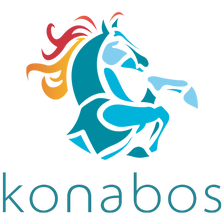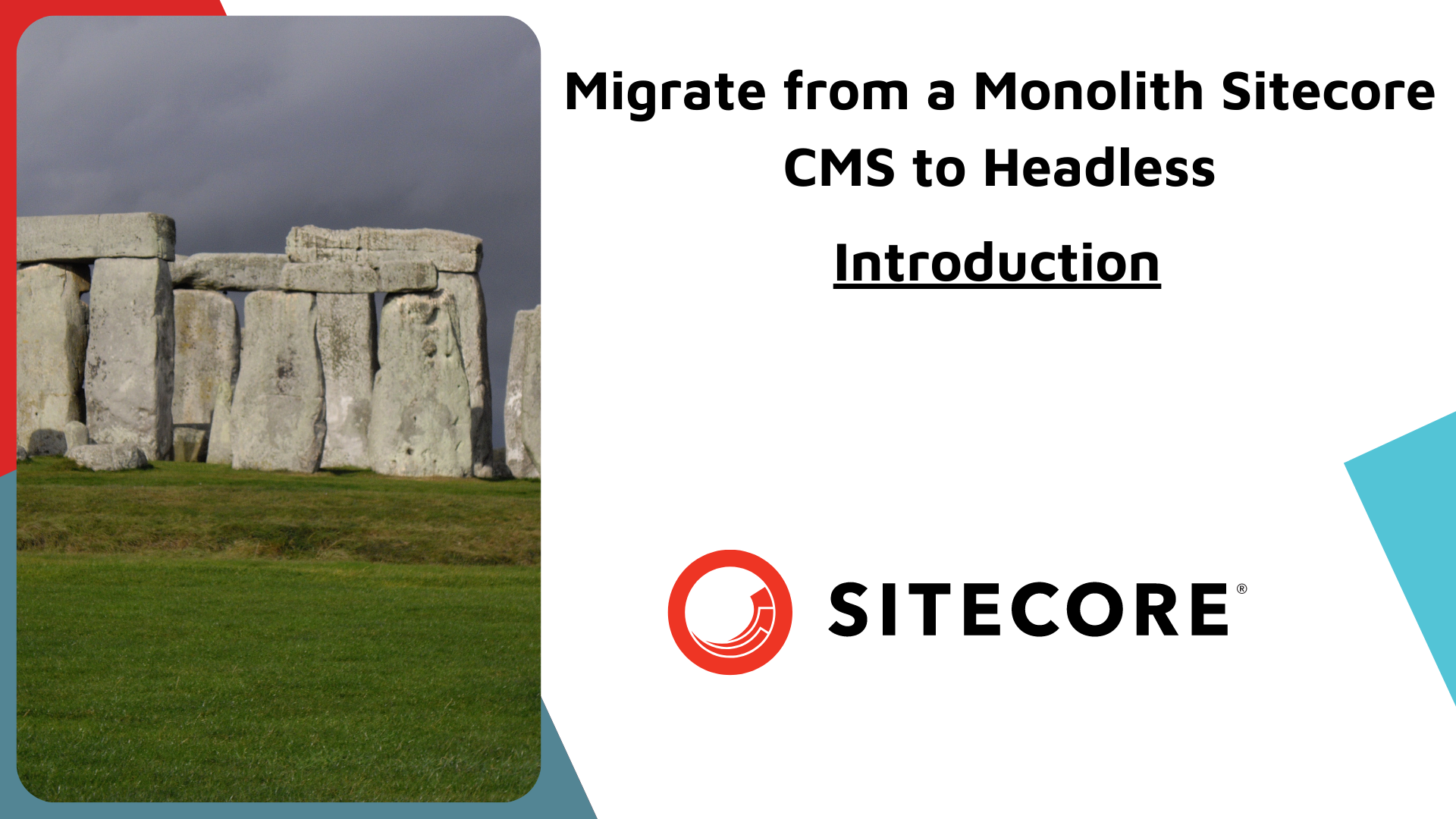Migrate from a Monolith Sitecore CMS to Headless: Introduction
Akshay Sura - Partner
7 Feb 2022
In this introductory video session, we talk about how to migrate from a Monolith Sitecore CMS to Headless and Composable DXP.
Note:
Since the recording of this video, Sitecore has released its Composable CMS, XM Cloud. Check out our XM Cloud resources.
Transcript
[The following is the transcription of the video produced by an automated transcription system.]
Hi, this is actually Akshay Sura from Konabos. Today we'll be talking about migrating from a monolithic Sitecore CMS to headless. So basically, getting into composable DXP. This is an introductory session, so we won't really be jumping into exactly how to migrate. This would be a series and we will discuss about the process of migrating from a monolithic CMS to more of the headless world. You've probably seen this slide so many times, but essentially what we're trying to do is move from a monolithic system where everything is encapsulated in one software into more of a composable DXP, where you can bring in the best of breed of software for, for instance, for analytics, or either bring new things in or re-use existing technologies. You already do some of the videos we've done in the past, they talk about quite a bit about composable DXP that it's a journey and not a destination, as well as road mapping sessions, and we've done quite a bit of those. I'll share a few slides with you which kind of go over, you know how you can get to those, but I really don't want to cover all of that. At the end of the day, we want this is for the use case where we've decided that we want to start exploring the possibility of going into a headless world. And how does that look is basically what we'll be looking into
We created a blog. I included the Bit.ly Link as well as the QR code. It's on our website basically talks about what is jamstack, what is composable DXP? What is headless CMS? And you can hear, Matt and Kamruz talk about it as well. Very useful for you to get into that concept. There's another blog post, which is kind of interesting this one Dennis and I go over it with Matt about what is composable DXP and why is it a journey and not a destination in this? We talk about, you know, where you are. And you know, I've mentioned this several times in this series that you're probably partway through your composable DXP journey anyways. A lot of the companies already use things like Marketo, or other marketing CRM based tools. They already use Google Analytics or other analytic tools. So, you're already, you know, have different pieces of your composable journey already in place. So, you know, again, there's a QR code as well as a link for you to go explore that. I would definitely suggest you do that last, but not the least, the road mapping for Sitecore customers. We released this pretty recently. Again, a very useful session in which we talk about how we approach road mapping with existing Sitecore customers where we start off with. We don't even put names in terms of what technologies we should use. We kind of go through the pain points. We come up with solutions and then for a particular solution in terms of how you would solve the challenge or a problem in the process, then we talk about the requirements and then help the customer make their decision on what's the best application or vendor to put in there in order to solve the problem. It definitely helps because you're not looking at it from a very, you know, vendor specific lens. You're looking at it more from solving a problem kind of lens. So absolutely use the Bit.ly Link or the QR code to get to that particular blogpost. We talked about this quite a bit. Going to headless are going to composable or making a journey to composable. It's a very agile process. It's not, you know, no one will be forcing you to do all, or nothing has to be done at the same time. So, it is something you can take your time, plan on it and slowly move towards making your pieces composable. So, if you are looking for analytics solution a personalization solution, you can figure out what you want to do, look at a couple of different options and options and then slowly move towards. It doesn't have to be done all or nothing or a specific time. The timeline is what you said to yourself. To be part of migrating is also reuse doesn't necessarily mean just because I want to migrate from a monolith. CMS to the composable DXP and headless doesn't mean I don't use any of the existing, you know, applications or stacks I already have in my company. If in your organization, you might already have a proficiency in Google Analytics, Google Tag Manager, you might use, you know, marketo HubSpot or act on any other tools that you use to have landing pages forms. You might already have set up funnels, not necessarily that you're going to scrap all of that and then move to something new. Part of being composable and. Headless is also reusability, you can reuse what you already have as well. Another thing to mention, which is very interesting, like as you see more there was there was a concept of a second CMS a month or two ago. And every day it seems like we come up with a newer methodology and a new methodology and a new term. I think Gartner or Forrester, I forget who came up with multiple CMS says as the new terminology rates are now, everyone and their mother will try to use it. But essentially, what they're trying to convey, the message is you don't have to scrap your existing CMS to completely move to one other option. What they are basically saying is there's nothing wrong with using one headless CMS for a purpose. Stay on your monolith for another purpose. Go to another headless CMS for a different purpose based on what use cases you're trying to hit and problems you're trying to solve. There is this concept of multiple CMS or a second CMS where you are allowed to have multiple doesn't necessarily mean it's always one or nothing. So, in terms of you being on a monolith Sitecore CMS, if you have a use case where you're launching quite a bit of these, you know, brochure where landing page kind of sites, you might want to choose a headless CMS to try it out. See if that works for you. Maybe you're launching a new mobile app. Maybe you're trying to integrate with a gaming console or a POS system, and you want to offshoot that on to its own CMS. It's a good use case for you to do that, and really, it's not necessarily that you scrap what you already have. Maybe there's space in the ecosystem for you to have your monolith and other systems in place which take the place of, you know, whatever your challenges are with the monolith it may be. Time to market is an issue. So maybe the marketing sites which need to go faster could be moved on to a headless CMS to make it faster. So, think of it that way. And again, as usual, any questions hit us up on social email us or have the QR code for our website right there. The goal of this series is for us to look at if you are planning on migrating off of a Sitecore monolith CMS, how exactly does it look? There's a lot of options in the ecosystem. This content hub, there's contentful for Kontent, content stack, you name it. There's so many, right? So, it's a decision paralysis at some point, but it's OK, we'll get through it. So, in this series, we'll start to look at, you know, this is the intro. We'll start to look into how exactly if you are planning on doing it, what you should be doing. I mean, we are speaking from experience. We've moved a couple of brands who've had, you know, several brands for themselves. So, a couple of these companies have about one of them has thirty-three brands. The other one has twenty-five in different manufacturing sectors. And, you know, they're ingrained in their process. And how did we move from a very monolithic commerce and had, you know, monolithic CMS to more of a headless, composable DXP approach is what we are going to share. I hope this was useful. You know, thank you for watching.
If you have any questions, please get in touch with me. @akshaysura13 on Twitter or on Slack.

Akshay Sura
Akshay is a nine-time Sitecore MVP and a two-time Kontent.ai. In addition to his work as a solution architect, Akshay is also one of the founders of SUGCON North America 2015, SUGCON India 2018 & 2019, Unofficial Sitecore Training, and Sitecore Slack.
Akshay founded and continues to run the Sitecore Hackathon. As one of the founding partners of Konabos Consulting, Akshay will continue to work with clients to lead projects and mentor their existing teams.


